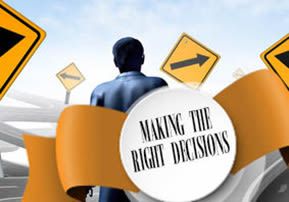
Making the Right Decisions
We don't want our mind's “mind of its own” to make important decisions for us! We want to be in conscious control of the decisions we're making...

Our decisions are very powerful; they can literally change our whole life because every single facet of our existence is structured around our decisions from where we are going to live, to what we are going to do to make a livelihood, to who we are going to marry, and how we are going to react, when someone cuts in front of us on the highway. Back in 1955, a woman in Montgomery, Alabama named Rosa Parks made a decision that she would not listen to the bus driver and give up her seat in the “colored section” of the bus to a white passenger. Just look at the power of Rosa Park’s decision to stand up for equality: not only did her decision turn her into a key figure in the civil rights movement, but it re-shaped the whole American cultural landscape.
Closer to home, there is a mass grave of 33,000 Jewish martyrs buried in Uman, in the Ukraine, who chose to die for G-d, instead of being forcibly baptized by their Cossack attackers, and changing their religion. The decision of those Uman martyrs affects and continues to affect the whole world. Their self-sacrifice for G-d was one of the primary reasons that Rebbe Nachman wanted to be buried next to them, and now, tens of thousands of Jews congregate by his grave, right next to the site of the martyrs’ burial  place, every single year, on Rosh Hashanah.
place, every single year, on Rosh Hashanah.
So there’s tremendous power in a decision, and we’re making those powerful, potentially life-changing choices every single second. Look at what’s happening right now – I’m focused on deciding what to write about, and how best to do it, and you are deciding whether to read it, and then, whether to try and internalize it!
Even if I’m not making decisions consciously, I’m still deciding things with my unconscious mind all the time. And if my unconscious mind is calling the shots by itself, then the decision I make probably isn’t going to be in alignment with what I really want. There’s a saying that our mind has a mind of its own, and personally, I don’t want my mind’s “mind of its own” to make important decisions for me! I want to be in conscious control of the decisions I’m making, whether it’s moving to a new apartment, changing jobs, making aliyah or whatever it might be.
One of the key ways we can see how much we are really in control of our own thoughts and decisions is to look at how much we think about ourselves, and how much we think about the people around us. There is a constant tension, or even conflict, in our minds between our own self-interest and thinking about others.
We may have a fairly good grip on our conscious mind, and be consciously encouraging ourselves to be more giving, more patient, more generous etc. But even if we have a conscious mind like a steel trap, our unconscious mind is a much easier target for the Evil One to infiltrate, especially when we are asleep. Our thoughts are the Evil Inclination’s favorite battleground. He is always looking for new ways and new ploys to get us discouraged and miserable and depressed and angry, and to take actions that aren’t aligned with our conscious desire to do good and to live our Torah way of life. And the best way he can do that is to try and slip into our unconscious mind.
So how can we stop the Evil One’s sneaky attacks and negative mind games? In Emuna Coaching, we have the methodology on how to focus our minds positively, but we also have something that secular psychology dismisses completely, namely, morality. This means that we make the focus “other people”, rather than exclusively ourselves. Maybe this sounds counter-intuitive; after all, Hillel the Elder wrote in The Ethics of our Fathers: “If I am not for myself, then who will be for me?” Who ever heard of going for therapy to try and help other people?
But focusing on others is actually one of the greatest kindnesses we can do for ourselves, in a number of ways. Over the years, I’ve worked with a number of elderly people, and it’s been very striking to see the enormous difference in the quality of life of people, oftentimes religious people, who spent their whole lives focused on doing for and giving to others. These people are usually more mentally stable than their “self-focused” peers, and they’ve definitely had more fulfilling lives. When G-d sees people who have decided to be givers, He in turn gives them more joy and satisfaction from their lives. Studies have proven that when people are squeezed for time and they decide to give time to help other people anyway; they give away time that they don’t “objectively” have, then G-d steps in and gives them the subjective sense of expanded time, and instead of feeling “time poor” they end up feeling “time rich.”







Tell us what you think!
Thank you for your comment!
It will be published after approval by the Editor.